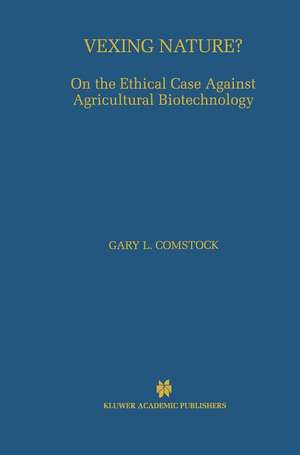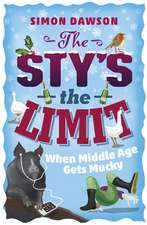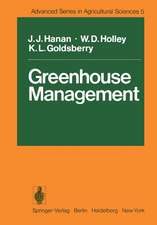Vexing Nature?: On the Ethical Case Against Agricultural Biotechnology
Autor Gary L. Comstocken Limba Engleză Paperback – 23 oct 2012
| Toate formatele și edițiile | Preț | Express |
|---|---|---|
| Paperback (1) | 945.30 lei 6-8 săpt. | |
| Springer Us – 23 oct 2012 | 945.30 lei 6-8 săpt. | |
| Hardback (1) | 952.89 lei 6-8 săpt. | |
| Springer Us – 30 oct 2000 | 952.89 lei 6-8 săpt. |
Preț: 945.30 lei
Preț vechi: 1152.81 lei
-18% Nou
Puncte Express: 1418
Preț estimativ în valută:
180.87€ • 188.87$ • 149.37£
180.87€ • 188.87$ • 149.37£
Carte tipărită la comandă
Livrare economică 15-29 aprilie
Preluare comenzi: 021 569.72.76
Specificații
ISBN-13: 9781461355335
ISBN-10: 1461355338
Pagini: 312
Ilustrații: XI, 297 p.
Dimensiuni: 155 x 235 x 16 mm
Greutate: 0.44 kg
Ediția:2000
Editura: Springer Us
Colecția Springer
Locul publicării:New York, NY, United States
ISBN-10: 1461355338
Pagini: 312
Ilustrații: XI, 297 p.
Dimensiuni: 155 x 235 x 16 mm
Greutate: 0.44 kg
Ediția:2000
Editura: Springer Us
Colecția Springer
Locul publicării:New York, NY, United States
Public țintă
ResearchDescriere
Agricultural biotechnology refers to a diverse set of industrial techniques used to produce genetically modified foods. Genetically modified (GM) foods are foods manipulated at the molecular level to enhance their value to farmers and consumers. This book is a collection of essays on the ethical dimensions of ag biotech. The essays were written over a dozen years, beginning in 1988. When I began to reflect on the subject, ag biotech was an exotic, untested, technology. Today, in the first year of the millenium, the vast majority of consumers in the United States have taken a bite of the apple. Milk produced by cows injected with a GM protein called recombinant bovine growth hormone (bGH), is found, unlabelled, on grocery shelves throughout the US. In 1999, half of the soybeans and cotton harvested in the US were GM varieties. Billions of dollars of public and private monies are being invested annually in biotech research, and commercial sales now reach into the tens of billions of dollars each year. I Whereas ag biotech once promised to change American agriculture, it now is in the process of doing so.
Cuprins
Acknowledgements. Introduction. 1. The Case Against bGH (1988). 2. Against Herbicide Resistance (1990). 3. Against Transgenic Animals (1992). 4. Against Ag Biotech (1994). 5. Problems for the Case Against Ag Biotech, Part I: Intrinsic Objections. 6. Problems for the Case Against Ag Biotech, Part II: Extrinsic Objections. Conclusion. Credits. Index.
Recenzii
`Vexing Nature? is an intriguing intellectual adventure in the ethical assessment of technology. Whereas Comstock was once almost a 'global opponent' of GM foods, he has since changed his mind, and is now a cautious champion. The book contains several surprising twists, and much rich philosophical analysis. It will clearly help to advance the international discussion of this subject. Should be required reading for anyone interested in the GM controversy.'
Donald N. Duvick, Senior Vice-president Research, Pioneer Hi-Bred (retired), author of How much caution in the fields? (Science)
`This work is almost unprecedented in applied philosophy: a book that presents pro and con arguments by a man who has honestly and deeply felt the pull of the arguments on both sides. Comstock's struggle with the issues will enlighten them for all of us.'
Paul B. Thompson, Joyce and Edward E. Brewer Professor of Applied Ethics, Purdue University, author of Food Biotechnology in Ethical Perspective
`Gary Comstock has woven these timely essays into an important narrative that will be of interest to everyone who recognizes the ethical challenges posed by biotechnology. There is much to be learned from these pages. I hope the book enjoys the wide readership it deserves.'
Tom Regan, North Carolina State University, author of The Case for Animal Rights (1983) and Defending Animal Rights (2001)
`His discussion of bioethics raises issues of general interest to philosophers. This will make an excellent text for environment ethics and, more generally, for courses in science, technology, and values.'
Choice, 39:02 (2001)
`It is therefore a worthwhile read for ethicists interested in agricultural biotechnology who are not already familiar with the work being done by agricultural ethicists on the issue, as well as for those working on the ethics of agricultural biotechnolopgy who are not already familiar with the subtleties of Comstock's revised position.'
Environmental Values, 12:3 (2003)
Donald N. Duvick, Senior Vice-president Research, Pioneer Hi-Bred (retired), author of How much caution in the fields? (Science)
`This work is almost unprecedented in applied philosophy: a book that presents pro and con arguments by a man who has honestly and deeply felt the pull of the arguments on both sides. Comstock's struggle with the issues will enlighten them for all of us.'
Paul B. Thompson, Joyce and Edward E. Brewer Professor of Applied Ethics, Purdue University, author of Food Biotechnology in Ethical Perspective
`Gary Comstock has woven these timely essays into an important narrative that will be of interest to everyone who recognizes the ethical challenges posed by biotechnology. There is much to be learned from these pages. I hope the book enjoys the wide readership it deserves.'
Tom Regan, North Carolina State University, author of The Case for Animal Rights (1983) and Defending Animal Rights (2001)
`His discussion of bioethics raises issues of general interest to philosophers. This will make an excellent text for environment ethics and, more generally, for courses in science, technology, and values.'
Choice, 39:02 (2001)
`It is therefore a worthwhile read for ethicists interested in agricultural biotechnology who are not already familiar with the work being done by agricultural ethicists on the issue, as well as for those working on the ethics of agricultural biotechnolopgy who are not already familiar with the subtleties of Comstock's revised position.'
Environmental Values, 12:3 (2003)
Notă biografică
Gary L. Comstock is Professor of Philosophy and Religious Studies, and Coordinator of the Bioethics Program, at Iowa State University (ISU), USA. Comstock is best known as the director of the ISU Bioethics Institute, a faculty development workshop that has helped hundreds of life scientists from around the world to integrate discussions of ethics into their courses. He has published dozens of articles; edited the volume, Is There A Moral Obligation to Save the Family Farm? (ISU Press, 1987), compiled Religious Autobiographies (Wadsworth, 1995), and is editing a collection of essays titled Life Science Ethics. A popular speaker who has lectured across Europe, Canada, Central America, and East Asia, he won his College's Award for Excellence in Outreach in 1998.








